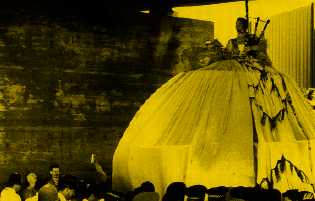The Networked Underground
DiY Culture: Party and Protest in Nineties BritainEdited by George McKay (Verso £11.00)
In the absence of a grand récit to inspire and guide counterculture in the nineties, its practitioners have, in typically postmodern fashion, elevated methodology to the level of substance. What emerges most clearly from this collection, beside the sense of bricolage suggested by the title, is one of interconnectedness: the underground, like the society it opposes, is - to borrow Manuel Castells's terminology - networked.
This accounts for the diversity and, often, contradictory nature of the programs marching under the DiY banner. You've got the neo-Luddite 'Dongas Tribe', who wander southern England's green and pleasant land with horse and cart, sharing mess-fatigues with the technophiliac creators of Preston's ART LAB, whose walls display wild assemblages of digital circuit boards and computer monitors turned into constant static. You've got Earth First! radicals, raging against the rape of the Mother Planet, breaking crusts with Her very rapists at benefits for out of work ex-miners. The ironies run deeper: the on-your-bike-and-do-something credo of the anti-capitalist alliance is, of course, essentially Thatcherite. 'Ecology', a term coined by the proto-Nazi German zoologist Ernst Haeckl in 1897, is an eminently reactionary notion (natural law and order, purity, control und so weiter) - one readily employed today, as George McKay points out in his introduction, by far right groups in the USA and Germany.
So, how can DiY culture consistently theorise itself? It can't. Which is fine. The attempts that work, interestingly, tend to look to Situationist, and even Surrealist and Dada, forebears. John Jordan's excellent chapter on Reclaim the Streets presents direct action as a rendering connected and communicative of the alienated, lonely body of technocratic culture: in Wanstead's Claremont Road, living rooms were reassembled on the tarmac, transforming the street into "a vibrant space in which to live, eat, talk and sleep"; a hole was cut through the connecting walls of thirty-five houses to create a tunnel, which then functioned both as an escape route from bailiffs and as a metaphor - a Whiteread- or Kabakov-like piece of installation art. Hillegonda Rietveld, in her essay on the politics of dance culture, sees the phenomenon of thousands of ravers sharing a blissful, non-productive and politically neutral state as a kind of 'ludic revolution', and goes on to dub their pleasure jouissance.
Of the attempts that don't work, some indulge in vulgar and reductive Marxism (is that tautologous?): the Aufheben group's diatribe on "The politics of anti-road struggle and the struggles of anti-road politics" (inversion, see?) would be odious if it weren't so absurd. At one point we're invited to understand an outbreak of violence as a manifestation of Hegelian Aufhebung - the sublime double-movement of annulment and elevation to a higher plane, cheekily translated by Derrida as releve - in which bourgeois ideology is negated by its opposite, Spirit realised as a riot. Others wallow in occultism - what Adorno called 'the metaphysic of dunces'. Alex Plows of Earth First! spends his chapter denying he's a New Ager while churning out buckets of New Age twaddle: yin and yang, Solstice celebrations, drumming, dancing round stones and so on.
Some groups refuse to theorise, preferring to sit back, skin one more up and murmur: Legitimation crisis? What legitimation crisis? Among these are the members of the Exodus Collective, basically thoroughly good and sociable people who like organising parties, renovating vacant property and giving lost and lonely youths a sense of purpose and belonging. On the other hand, though, there's a telling quote from Merrick, one of the Newbury protesters: perched up in his tree house, he muses: "Fuck it, I'm here coz I'm right". Watch out for someone who just knows he's right. That, as William Burroughs said, is the mark of a true shit.
Tom McCarthyXtom AT metamute.comX
Mute Books Orders
For Mute Books distribution contact Anagram Books
contact@anagrambooks.com
For online purchases visit anagrambooks.com







